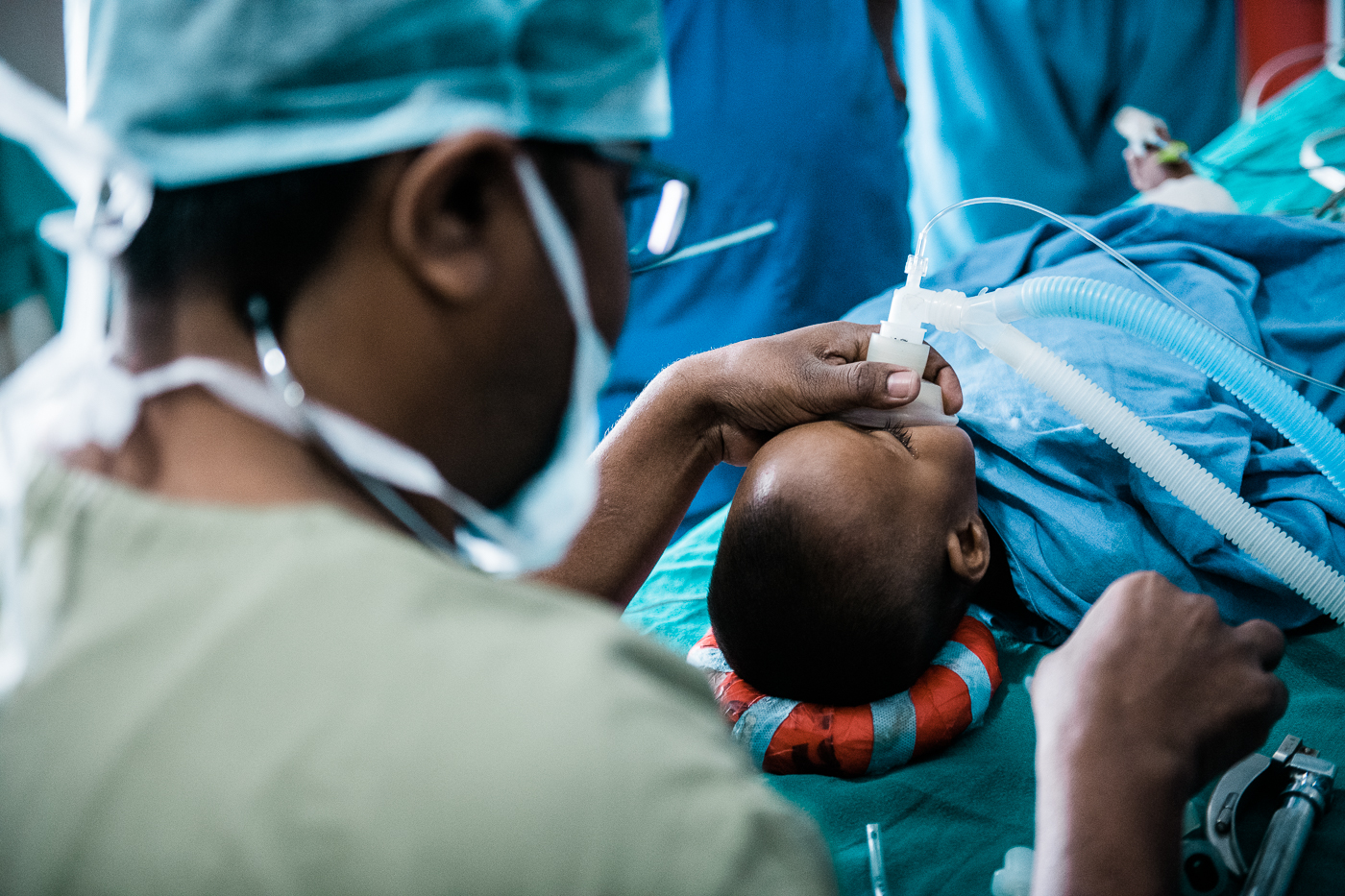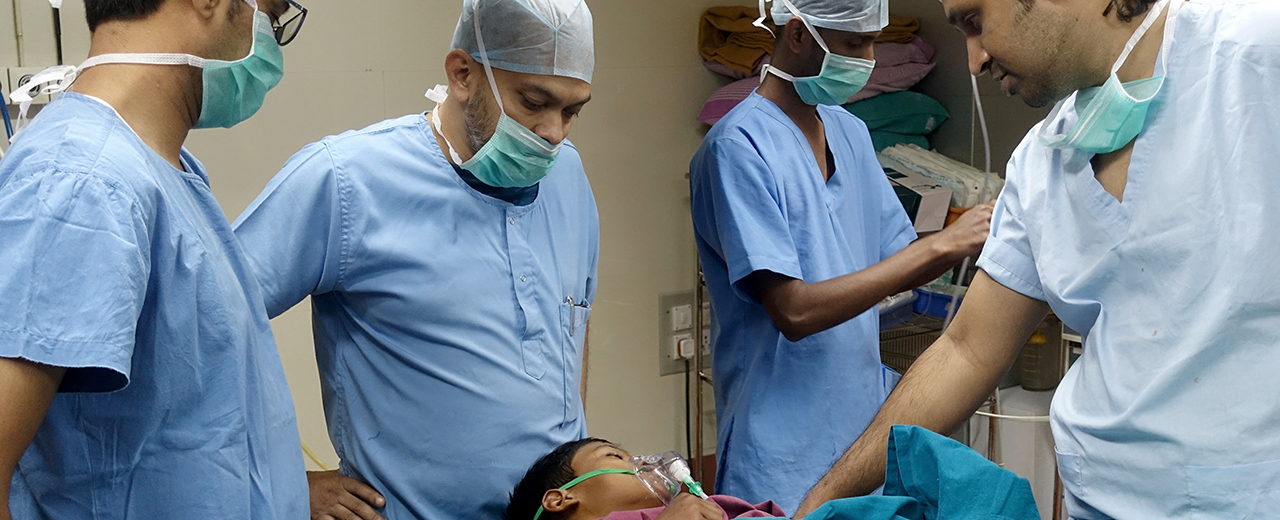 Give the gift of a smile
Give the gift of a smile
A future for children with cleft lip and palate in India
It takes two days for the young couple to make the arduous journey from their home village in the middle of the Bengal Delta to the big city of Kolkata. Along for the ride: their little daughter. Amina was born with a cleft lip and palate. A large gap disfigures the girl's face, and the palate is also affected. Breastfeeding is hardly possible, Amina is often sick. Visits to the doctor are only possible to a limited extent, there is not enough money. In the village, the family is shunned, Amina is bullied by the other children. By chance, they learn that there is help for Amina: She is to have an operation in Kolkata - and it will even be for free. Amina's parents can hardly believe their luck. They gladly accept the hardship of the journey. They know that Amina will feel better after the operation. They know that she will soon be able to drink normally, that she won't be sick as often and that Amina will look 'normal'. They can hardly wait to be back in the village.
Necessity
Operations for children with cleft palate malformation in India
Activity
Surgical intervention carried out by qualified local medical teams in selected hospitals
Countable effort
Number of operations for children from disadvantaged families with a cleft lip and palate
Result
The operation paves the way for the children to grow up healthy, develop self-confidence and attend school
Systemic effect
Those affected are integrated into society, have access to education and thus the chance to lead a self-determined life
Background
A cleft lip and palate is one of the most common congenital malformations in the world. One in 500 to 600 newborns is affected. In Germany, that is around 1,400 babies born with a cleft lip and palate each year. In India, with a population of around 1.4 billion, it is assumed that there are around 35,000 “cleft children” (Indian Council of Medical Research, 2016). What causes the development of a cleft lip and palate is not clearly understood. It is referred to as a multi-factorial cause. It is certain that the malformation is favoured by a hereditary disposition. Malnutrition of the expectant mother, exposure to pollutants in the environment and food, lack of oxygen at high altitudes can be further factors (Parents’ brochure of the German Interdisciplinary Working Group on Cleft Lip and Palate). Cleft formation can affect the upper lip, the jaw and the palate. The primary treatment for any cleft is surgery to close the gap. As part of the German health care system, the cost of the surgery is covered by health insurance. This is not the case everywhere in the world. Around 80% of the Indian population work in the informal sector, for example as day labourers or taxi drivers. They have no occupational health insurance. So far, ‘only’ 500 million people are registered in the national health insurance scheme introduced ten years ago (GIZ GmbH). Without treatment – or if the intervention is too late – the children will often be affected for the rest of their lives. For them, friends, health and attending school are not a given. Because of the obvious disfigurement and slurred speech, they are stigmatised and ostracised. Depending on the type and extent of the cleft, there are also far-reaching functional limitations. Babies with a cleft palate cannot swallow or drink properly. They are often malnourished or undernourished and thus susceptible to infections. An abscess in the oral cavity can become life-threatening.
The good deed
With your good deed you finance one minute of inpatient treatment for a child with a cleft lip and palate in India. The operation is a crucial turning point in the child's life. It is an essential prerequisite for a life of health and dignity. The surgical procedure to close the cleft is performed by qualified local medical teams and costs an average of around 320 Euros. This includes the necessary examinations of the child before the surgical intervention, the anaesthesia, the operation itself, the hospital stay post-OP until the last check-up before discharge. In most children, it is lip and palate that are affected by the malformation. Closing a cleft lip ideally takes place around the third month after birth, palate surgery from 8 months of age.

About India
New Delhi
Capital
1,393,409.03
Number of inhabitants
2,277.4
Gross domestic product per capita per year
Rang 132 von 191
Human Development Index
India has the world's largest proportion of vegetarians. Around 38% of people refrain from eating meat, compared to just 7% in Germany (Statista, 2020).
About the organization and further information
Association
Deutsche Cleft Kinderhilfe e.V.
Website

Further information and source
- National Health Services, 2019, Cleft lip and palate
- Kharbanda et. al., 2016, Cleft Lip and Palate Anomaly in India: Clinical Profile, Risk Factors and Current Status of Treatment: A Hospital Based Study, Indian Council of Medical Research Task Force Project Report, New Delhi
- Deutsche Cleft Kinderhilfe e.V., Hilfe für Spaltkinder in Indien
- World Bank, 2021, Poverty and Equity Brief, India, World Bank Data Bank.




